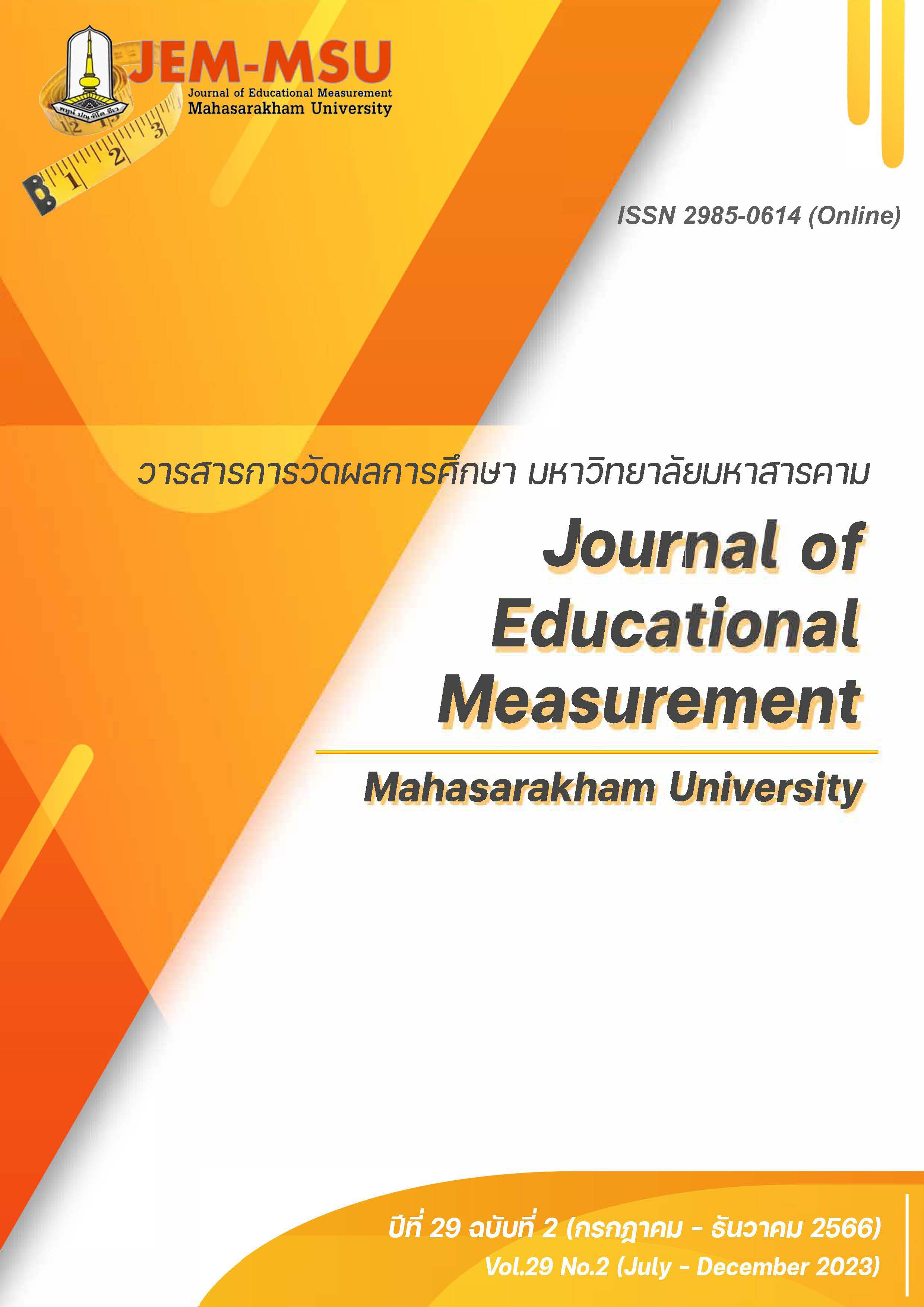Developing a Self-learning Model Using Mind Map to Enhance Academic Achievement of Middle-aged and Elderly Undergraduate Students in the Distance Education System of Sukhothai Thammathirat Open University
Main Article Content
Abstract
The purpose of this research was to develop and evaluate the learning model experiment by using a mind map to enhance the academic achievement of middle-aged and elderly undergraduate students in the distance education system of Sukhothai Thammathirat Open University. Phase 1 dealt with development of the self-learning model. The sample consisted of 385 students. Data were collected through online surveys. Phase 2 dealt with the experimental research with a sample comprising 70 students. The analysis of data employed descriptive and inference statistics.
The research findings were as follows: 1. The self-learning model’s activities consisted of 6 steps: 1) screening target groups, 2) measuring and evaluating previous knowledge, 3) adding new knowledge, 4) learning and doing, 5) measuring learning development, and 6) learning evaluation. The item content validity index (I-CVI) was in the range of .89 – 1.00 and the scale content validity index (S-CVI) was .97, meaning that the model had suitability for further use. 2. The results of the learning model experiment revealed that 2.1 The students in the experimental group had higher learning achievement and mind mapping ability after the experiment than before the experiment, and higher than the control group, with statistical significance at the .05 level; 2.2 students with different disciplines and learning styles had no differences in learning achievement and mind mapping ability.
Article Details

This work is licensed under a Creative Commons Attribution-NonCommercial-NoDerivatives 4.0 International License.
The content and information contained in the published article in the Journal of Educational Measurement Mahasarakham University represent the opinions and responsibilities of the authors directly. The editorial board of the journal is not necessarily in agreement with or responsible for any of the content.
The articles, data, content, images, etc. that have been published in the Journal of Educational Measurement Mahasarakham University are copyrighted by the journal. If any individual or organization wishes to reproduce or perform any actions involving the entirety or any part of the content, they must obtain written permission from the Journal of Educational Measurement Mahasarakham University.
References
Buzan, T. (1995). The mind map book. BBC Books.
Dixon, W.B. (1992). An exploratory study of self-directed learning readiness and pedagogical expectations about learning among adult inmate learners [Doctoral dissertation]. Michigan State University. https://doi.org/doi:10.25335/M5NV90
Ferketich, S. (1991). Focus on psychometrics: Aspects of item analysis. Research in Nursing & Health, 14, 165–168.
Fisher, D., Lapp, D. & Flood, J. (1999). Technology & Literacy: Is There a Positive Relationship?. The California Reader, 32(4), 35-38.
Hiemstra, R. (1994). From Behaviorism to Humanism: Incorporating Self-Direction in Learning Concepts into the Instructional Design Process. Oklahoma Research Center for Continuing Professional and Higher Education.
Jumnaksarn, S. (2021). The Development of a Measurement and Assessment Model for Elderly Distance Education Student at Sukhothai Thammathirat Open University. ASEAN Journal of Open and Distance Learning. 13(2). 55 – 67.
Krejcie, R.V., & Morgan, D.W. (1970). Determining sample size for research activities. Educational and Psychological Measurement, 30(3), 607–610.
Lovell, R.E., (1980). Adult Learning. John Wiley & Sons.
Martinez, R.M., Lourenco, F.R., & Baby, A.R. (2021). Case study of mind mapping as an educational tool for a pharmaceutical course on drug formulation design. Pharmacy Education, 21(1), 178-185.
Polit, D.F., & Beck, C.T. (2012). Nursing Research: Generating and Assessing Evidence for Nursing Practice (9th ed.). Wolters Kluwer Health
Streiner, D.L. (2003). Being inconsistent about consistency: When coefficient alpha does and doesn't matter. Journal of personality assessment, 80(3), 217-222.
Svanstrom, M., Sjoblom, J., Segalas, J., & Froling, M. (2018). Improving engineering education for sustainable development using concept maps and multivariate data analysis. Journal of Cleaner Production, 198, 530–540.
Syahmani, S. (2019). Self-regulated learning model with mind map to improve students cognition and metacognition skills in solving chemical problems. Journal Penelitian Pendidikan Sains, 8(2),1690.
Chuawong, B. (2020). The Development of Essay Writing Abilities by Using Learning Package with Concept Mapping for Matthayom 2/1 in St. Francis Xavier Convent School [Research Report]. Suan Sunandha Rajabhat University. (in Thai).
Khammanee, T. (2002). Teaching science: knowledge for the learning process to be effective. (21th ed.). Chulalongkorn University Press. (in Thai).
Limtasiri, O., (2014). Integrated learning management (6th ed.). Ramkhamhaeng University Press. (in Thai).
National Statistical Office. (2022). Summary of important results, Working of the elderly in Thailand 2021. Forecast Statistics Division, National Statistical Office. (in Thai).
Phongsaksri, J., Teeraputon, D., & Natakuatoong, O. (2017). Development of Collaborative Learning Model on Internet based Instruction Using Mind Map to Develop Creative Thinking of Undergraduate Student Industrial Design Programme. Journal of Education Naresuan University. 21(2), 54-63. (in Thai).
Ratana-Ubol, A., (2016). Learning of adults and the elderly in Thai society. Chulalongkorn University Press. (in Thai).
Wangchob, S., Homkham, U., Boonket, N., & Sanguansat, K., (2020). Effects of Refective Practice Learning by Using Structural and Independent Online Mind Mapping Affecting Critical Thinking Ability of Undergraduate Students with Different Learning Styles. Journal of Graduate School, Pitchayatat. 15(1), 181-193. (in Thai).
Wiboolyasarin, W. (2013). Innovations and Media for Teaching and Learning in the Thai Language. Chulalongkorn University Press. (in Thai).


